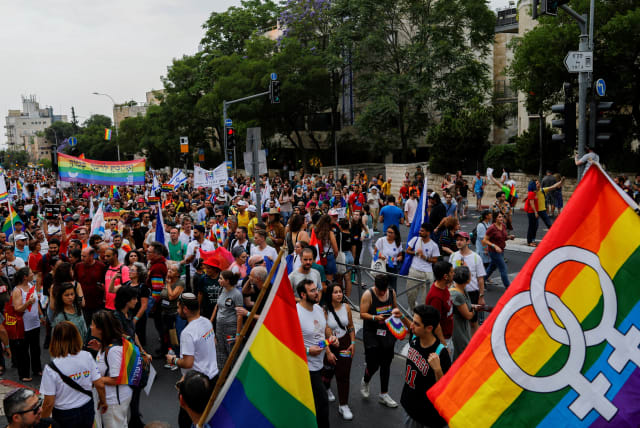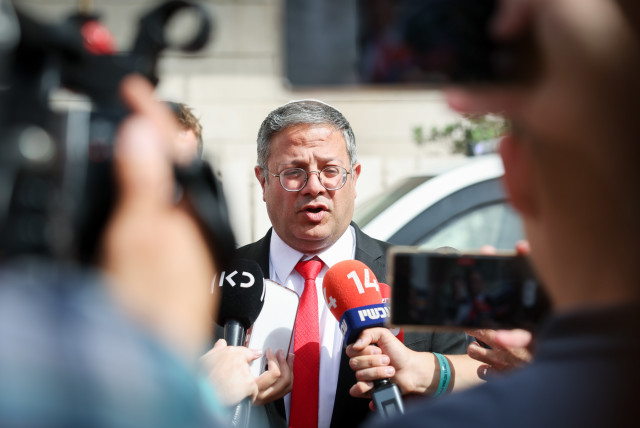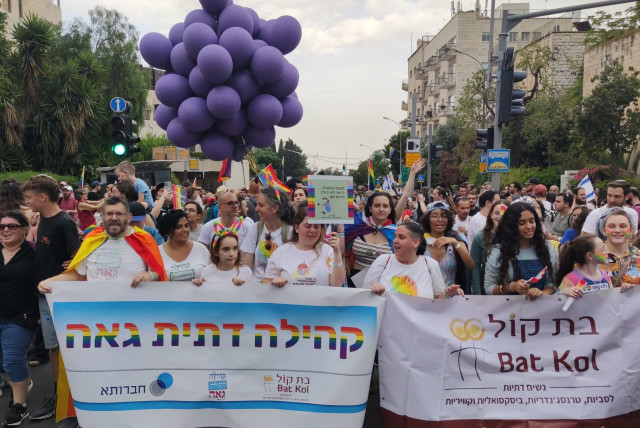30,000 Israelis gather in Jerusalem for pride march amid heavy police presence

National Security Minister Ben-Gvir: Marchers' security above all, but freedom of speech of those who oppose pride march must be respected.
About 30,000 people gathered in the capital for the Jerusalem Pride and Tolerance March on Thursday afternoon, as thousands of police officers secured the event.
Despite even higher tensions than usual surrounding the event, the March was conducted without any violence and with intensive celebrations accompanied by speakers blasting Jewish music.
The Jerusalem pride march is unique in its character which is fitted to the character of the capital, with a heavy presence of the religious LGBT community and more of a political protest than the Tel Aviv Pride parade and other Pride events throughout the country.
#Jerusalem #Pride is somewhat unique among Pride marches as it tends to be more family friendly and has a large religious attendance blasting Jewish songs and dancing. pic.twitter.com/D3n11lahtm
— Tzvi Joffre (@TzviJoffre) June 1, 2023
Booths from NGOs and community organizations full of t-shirts and stickers were set up around Liberty Bell Park.
A group of mothers showed up to the March to offer free hugs to participants with t-shirts reading "everyone needs a parent's love."
The great-grandson of former Sephardi Chief Rabbi Ovadiah Yosef attended the March as well, telling KAN news "I can't stand to the side. A public that feels that it does not have a place in its city needs to go and shout: 'I am here!'"
Mindy, the mother of Roei, a transgender boy who was kicked out of a religious elementary school in Givat Shmuel, took part in March as well, speaking out for the need to protect children like her son from transphobia, at the closing ceremony of the event.
Approximately 2,000 Jerusalem District police officers, including Border Police officers, will be operating along the parade route to secure the event.
Three Israelis were arrested in recent days for making threatening comments concerning the March, according to Israel Police.
The suspects were detained as Israel Police was on higher alert in the last few days in the runup to Pride Month.
The first suspect detained was a man in his 60s from near Jerusalem. He was detained on Wednesday night after writing social media posts encouraging people to murder participants in the march. At the end of his interrogation, the man, who denied that he intended to threaten or encourage harm, was sent to house arrest and was given a restraining order from Jerusalem for five days.
The second, a man in his 40s from Jerusalem was detained after he made extreme comments in an "unusual and suspicious manner" to another person about the march.
The third man, a Ramle resident was detained after making extreme anti-LGBTQ+ comments in a Telegram post on Wednesday. He too was given a multiple-day restraining order from Jerusalem at the end of his investigation.
Israel Police prepare for Pride Month
In mid-May, a man was arrested and issued a restraining order distancing him from all Pride events this year, after sending a threatening email to the Jerusalem Open House reading "I hope that Yishai Schlissel (the haredi man who murdered Shira Banki, a 15-year-old girl, at the 2015 Pride parade) will be there to finish the job he started. [It's] disgusting how you celebrate this mental disorder."
During the march, the far-right Lehava organization held a protest against the event at Blumfield Park, across from the entrance to the opening stage at Liberty Bell Park.
About 40 demonstrators waved signs against the LGBT community and chanted: "Don't give them children," "No entry to the Holy Land" and "Jerusalem is not Sodom."
On Wednesday, the Hamas terrorist movement condemned the Jerusalem pride march, calling for Palestinians to "confront" the event.
Following a security assessment in Jerusalem, National Security Minister Itamar Ben-Gvir - an associate of Lehava leader Benzi Gopstein - said that the freedom of speech of those who oppose the march must be respected.
Ben-Gvir was greeted with chants of "Shame!" after arriving at the police command center near the March.
Earlier this week, Ben-Gvir said that "police's role above all is to secure and guard the marchers. At the same time, the police must do everything to allow the demonstrators against the parade to exercise their freedom of expression and freedom to protest.
"These are basic rights in a democracy and must be protected. People must not be turned away or detained solely because of their religious appearance or their intention is to demonstrate against the parade," Ben-Gvir said.
Anti-reform movement joins pride march
In light of the protests against the government and the judicial reform, the march will serve as a demonstration of liberal values and pluralism, with the Jerusalem Open House for Pride and Tolerance stating it intends to hold it as "an event for everyone."
A number of protest movements joined the march.
The "Brothers in Arms" protest movement announced ahead of the march that it would "go up to Jerusalem to march in front of a Messianic government full of homophobes" on Thursday and called on other Israelis to join the march as well.
Members of the movement told The Jerusalem Post at the March that they were there both express support and to help protect the event.
Nearly 20 MKs participated in the march, all from the opposition, including from Yesh Atid, National Unity, Labor and Yisrael Beytenu
The Jerusalem Pride and Tolerance March was conducted along its traditional route, setting off from Liberty Bell Park, before heading up Keren Hayesod Street, continuing to Paris Square and King George Street, and turning on Hillel Street before ending off at Independence Park, where the closing event takes place.
The march was star-studded this year, with artists such as Ran Danker, Ivri Lider, Shahar Tavoch, Roni Duani, Etty Biton and Rinat Bar starring on the main stage and MKs Yair Lapid, Benny Gantz and Meirav Michaeli participating in the opening ceremony.
Neria Kraus, a journalist with Channel 13 news, and Eran Swissa, a journalist with Israel Hayom, hosted the main stage. Drag artist Uriel Yekutiel hosted the opening ceremony.
"Today, Jerusalem is decorated not only with a variety of colors and a variety of women, but also with a wide and spectacular variety of emotions and feelings - we are extremely happy for the privilege of celebrating who we are, with great anger at the need to continue demonstrating for our most basic rights, we hope that the parade will pass peacefully, and we believe it has the power to influence the future of Jerusalem," said Alon Shachar, CEO of the Jerusalem Open House for Pride and Tolerance, on Thursday.
The religious LGBT organization Havruta stated after the March, "The Jerusalem March is the strongest expression of our opposition to hate, and to the plans of the hate lobby to attack our community. Even hundreds of millions of shekels, the authority and standards of Avi Maoz and the Noam party will not be able to extinguish our love for the Holy One, Blessed Be He. We own who we are and our families."
Volunteers from the "Mothers Against Violence" group were present throughout the city center in order to prevent LGBT-phobic acts in the hours after the march.
The volunteers wore yellow vests with the Hebrew word "Ima" (Hebrew for mother) and Pride flags. Anyone who encountered an LGBT-phobic incident can report it to the Nir Katz Center, which collects data on LGBT-phobia.
Jerusalem Post Store
`; document.getElementById("linkPremium").innerHTML = cont; var divWithLink = document.getElementById("premium-link"); if (divWithLink !== null && divWithLink !== 'undefined') { divWithLink.style.border = "solid 1px #cb0f3e"; divWithLink.style.textAlign = "center"; divWithLink.style.marginBottom = "15px"; divWithLink.style.marginTop = "15px"; divWithLink.style.width = "100%"; divWithLink.style.backgroundColor = "#122952"; divWithLink.style.color = "#ffffff"; divWithLink.style.lineHeight = "1.5"; } } (function (v, i) { });


